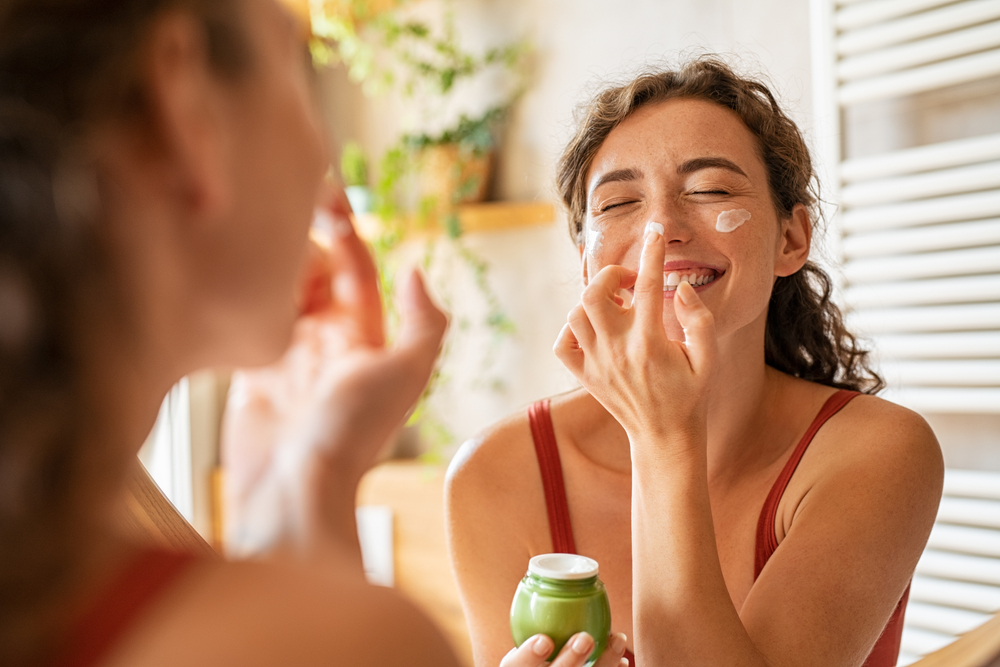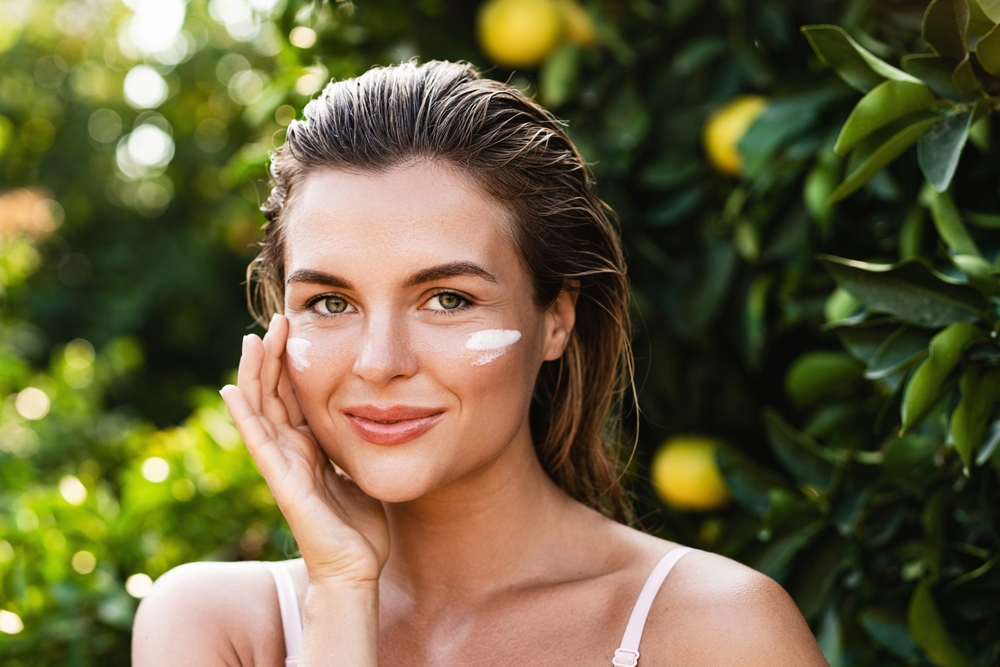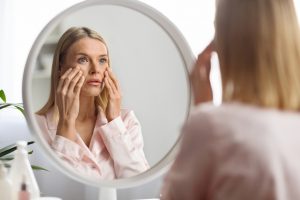As 48% Of Women Worry About Dehydrated Skin, Here’s How To Fight Back Against Dryness
Healthy, glowing skin helps you look and feel great, so when skin starts to change during the menopause due to hormonal shifts, it can have a negative impact on your confidence and leave you feeling self-conscious. A decline in moisture is one of the key changes to menopausal skin which in turn can lead to dryness, lines and wrinkles.
According to research by Hada Labo Tokyo – the number one skincare brand in Japan – dehydrated skin is the primary skin concern for women with 48% of those questioned stating that this was a worry, however, 42% of UK women didn’t know that the stages of the menopause can even affect their skin, let alone disrupt skin’s hydration status.
GP and skin specialist for Hada Labo Tokyo, Dr Nisa Aslam says: “Our skin, the largest organ in the human body, needs care and attention, just like our other organs. During perimenopause, a woman’s ovaries produce less of the hormone oestrogen, but it’s oestrogen which helps to maintain skin’s plumpness and moisture. When we lose oestrogen, our skin can dry out, making it look thinner and less luscious.”
According to the Hada Labo real-world data, 33% of women also cite a ‘lack of glow’ as a skin concern whilst 36% say they are concerned about wrinkles.

Dr Nisa Aslam adds: “The decline in oestrogen also leads to a decline in collagen and elastin, the two proteins found in our skin. Just 19% of women say they fully understand the role that collagen plays in skin health, yet it has a huge impact on our skin’s structure and elasticity. Women’s skin loses more collagen during the first five years of menopause,[2] alongside the natural decline of collagen which occurs with age. Elastin, which also declines over time, gives skin its flexibility, allowing it to bounce back after being stretched. A lack of it could lead to saggy skin.”
Knowing the potential changes that can occur to skin during menopause, makes it easier to prepare and put in place the skincare steps to try and counteract the impact of menopause.
According to the Hada Labo Tokyo research poll, for those women who haven’t yet entered perimenopause – the stages leading up to menopause – 35% say they are concerned about potential changes in their skin condition and 48% are starting to consider their skincare needs for when they are in menopause.
The hydrating ingredient all women need
Dr Nisa Aslam explains: “There’s one ingredient we all need to get to grips with, particularly ahead of and during perimenopause and menopause. That ingredient is hyaluronic acid. The matrix of collagen and elastin found within our skin is actually cushioned and supported by hyaluronic acid, however production of hyaluronic acid in the body also declines with age.”
Discussing the ins and outs of hyaluronic acid, Dr Nisa Aslam says: “Hyaluronic acid (HA) is a clear gel that’s made naturally within the body and one-third of our body’s hyaluronic acid is found in the skin.
“As we age though, our levels of hyaluronic acid begin to fall and by the time we reach the age of 50, our levels of hyaluronic acid have halved.”
Although six in ten women admit they have bought a skincare product because it promised a more youthful skin according to the Hada Labo Tokyo survey, just 18% fully understand the role of hyaluronic acid with regards to the health of their skin.
Dr Nisa Aslam adds: “There’s science to prove that when applied to the skin, hyaluronic acid can help to reduce wrinkles,[3] enhance hydration, improve firmness and elasticity and it can even help to manage eczema, a common skin condition.
“Essentially, hyaluronic acid is the hydration hero all women need, which is why it’s such a prominent ingredient in Hada Labo Tokyo skin care products. With 60% of women admitting that they spend more money on quality skincare products during this life stage, it’s important to ensure women are using products that work for their skin.”

Hada Labo Tokyo’s Premium Gold Line
To give menopausal skin plenty of hydration, Dr Nisa Aslam recommends Hada Labo Tokyo’s Premium Gold Line. Each product in this premium range contains seven types of hyaluronic acid to help provide super hydration, deep moisturisation and science-led skin support.
New Premium Hada Labo Tokyo Ultra Firming Booster 7XHA Day Cream-in-Milk is a powerful firming and moisturising cream of milk consistency, perfect under make-up for dehydrated and dull skin which may be losing its firmness.
For powerful hydration and moisturisation, Dr Nisa Aslam suggests New Hada Labo Tokyo Premium Lotion Intense 7XHA Super Deep Hydrator which penetrates deeper into the skin to give a complete, balanced and hydrating solution for radiant, smooth skin.
At night, try New Premium Hada Labo Tokyo Extreme Skin Regenerator 7XHA Night Super-Cream, a powerful regenerating and moisturising cream which helps fill lines and wrinkles.
Speaking of the seven types of hyaluronic acid found in the Hada Labo Gold Line, Dr Nisa Aslam explains: “Sodium Hyaluronate is a water-binding ingredient used for moisturising and hydrating, and it can replace some of the water lost in the epidermis, the top layer of skin; Sodium Acetylated Hyaluronate (Super) has a much greater capacity to retain moisture in the epidermis, keeping skin moist for longer periods of time; and Hydrolyzed Hyaluronic Acid (Nano) is hyaluronic acid essentially broken into smaller bits which can easily penetrate and help replace some of the water lost in the epidermis.”
Alongside these hyaluronic acids, Hada Labo’s Gold Line contains Sodium Hyaluronate Crosspolymer (3D), a modified form of hyaluronic acid attached to a polymer structure that keeps it within skin’s uppermost layers longer, creating a “sponge” effect for a fuller, more youthful appearance; Fermented HA: Lactococcus/ Hyaluronic Acid Ferment Filtrate, which works by enhancing the skin barrier function, suppressing water evaporating from the inner skin while strengthening the barrier function of the skin; Advanced Hyaluronic Acid: Hydroxypropyltrimonium Hyaluronate, known to moisturise the skin and minimise moisture loss thanks to the power of ions; and Hydroxypropyltrimonium Hyaluronate, a conditioning ingredient for the skin and it helps bond active ingredients into the skin.
With ageing, hormonal changes and external factors such as pollution and UV rays, it’s inevitable that skin will change.
“But ensuring Hada Labo Tokyo’s Gold Line is a part of your skincare routine, before, during and after menopause, will help quench skin’s thirst and help fight against dryness, lines and wrinkles so you can keep living your best life with the best skin,” says Dr Nisa Aslam





